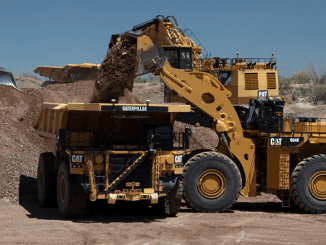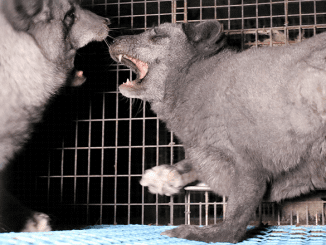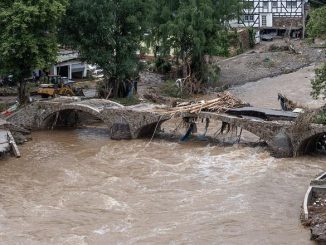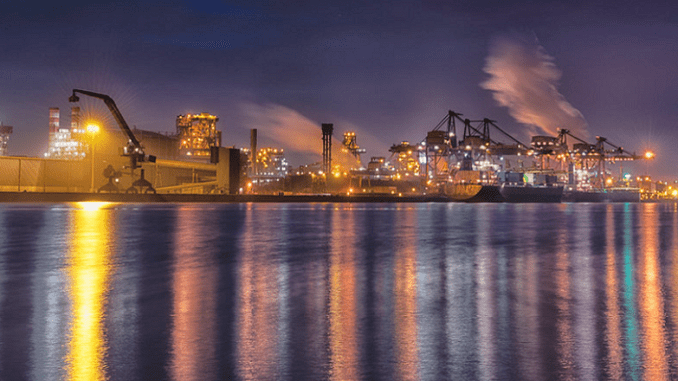
DUNKIRK, France, February 10, 2022 (ENS) – Steelmaking giant ArcelorMittal, based in Luxembourg, is decarbonizing its factories in France and has attracted the financial support of the French Government to accomplish a drop of 40 percent a year in ArcelorMittal’s CO2 emissions in France by 2030.
French Prime Minister Jean Castex visited the ArcelorMittal site in Dunkirk, France on February 4, to announce support from the French Government for ArcelorMittal’s decarbonization program in France, which involves a €1.7 billion (US$1.92 billion) investment from the company in its Fos-sur-Mer and Dunkirk sites.
A total of €5.6 billion will be allocated to decarbonizing industry as part of the France 2030 plan, Prime Minister Castex announced February 4 during his visit to the Dunkirk site, Euractiv France reports.
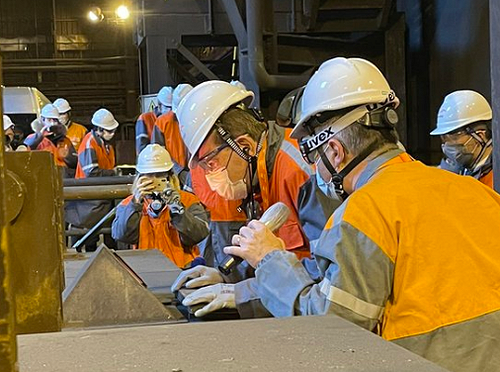
“The nation is going to make a massive but essential effort to bring our industry fully into the era of decarbonization, to make France a leader in the green industry,” Castex said.
Of the total figure, €5 billion will be for the deployment of new technologies on industrial sites, while the remaining €610 million will be used to support innovation and research for a low-carbon industry.
These investments will enable a profound transformation of steelmaking in the country, representing a 10 percent reduction in greenhouse gas emissions from the entire manufacturing industry in France.
Steel is made from iron ore, a compound of iron, oxygen and other minerals that occurs in nature.
The iron and steel sector directly accounts for 2.6 gigatonnes of carbon dioxide emissions annually, seven percent of the global total from the energy system and more than the emissions from all road freight combined.
ArcelorMittal says the investment puts France’s steelmaking industry on a path aligned with the 2015 Paris Agreement target of keeping global warming of the atmosphere to less than 1.5 degrees Celsius above pre-industrial temperatures.
Eric Niedziela, chairman of ArcelorMittal France and vice president Climate Action ArcelorMittal Europe, commented, “ArcelorMittal is honored that the French State supports our projects. We are proud to have this unique opportunity to contribute to the objectives of the France 2030 plan and to maintain a strong manufacturing industry in France, serving European markets.”
“ArcelorMittal’s management team and its 15,500 employees in France are mobilized to succeed in this new industrial revolution,” Niedziela said, “and we will be happy to welcome new talents willing to participate in this extraordinary adventure.”
ArcelorMittal will implement €1.7 billion of investments by 2030 to accelerate the decarbonization of its steelmaking sites in Fos-sur-Mer and Dunkirk.
Utilizing Recycled Steel, Scrap Steel
In Fos-sur-Mer, ArcelorMittal will build an Electric Arc Furnace. This new unit will complement the ladle furnace announced last March and supported by France’s recovery plan, France Relance. Together, these investments are expected to turn Fos-sur-Mer into a reference site for the production of low carbon, circular steel, made from recycled steel.
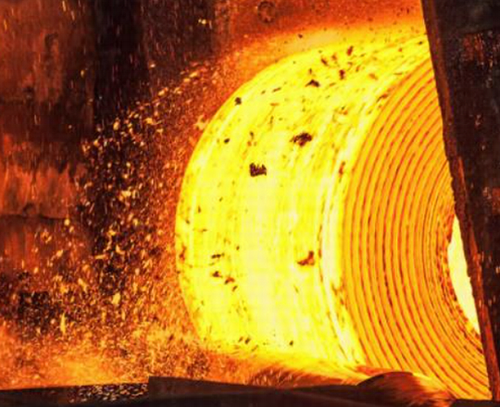
At the company’s integrated iron and steel facility at Dunkirk with its blast furnaces, steel plants and rolling mills, ArcelorMittal will build a 2.5 million tonne Direct Reduction of Iron, DRI, unit to transform iron ore using hydrogen instead of coal.
This DRI will be coupled with an innovative electric furnace and completed by an additional Electric Arc Furnace. Other investments are already underway to continue to increase the proportion of scrap steel used.
Yves Koeberlé, CEO of ArcelorMittal Europe, Flat Products, said, “As a leader in steelmaking, ArcelorMittal is committed to decarbonizing its plants in Europe to serve our industrial customers – automotive, packaging, construction, transport but also solar and wind energy and future networks for hydrogen and CO2 capture.”
“We are grateful for this support from the French state,” Koeberlé said. “It will enable a major transformation of our sites in Fos-sur-Mer and Dunkirk, which together account for over one-third of ArcelorMittal’s flat steel production in Europe.”
To decarbonize, ArcelorMittal says the company’s strategy will change the way it produces steel in three ways:
- – Increasing the recycling of steel: one kilo of steel produced by ArcelorMittal in France will soon contain up to 25 percent recycled steel
- – Developing an innovative DRI process to make steel without coal, with hydrogen
- – Capturing residual carbon dioxide (CO2) to store and use
The French multinational industrial gas supplier Air Liquide will support this strategic initiative through the supply of low-carbon hydrogen and the implementation of CO2 capture technologies in Dunkirk, one of Air Liquide’s historic industrial locations in France.
The Air Liquide group has developed expertise in hydrogen production, storage, and distribution, as well as CO2 capture technologies.
This partnership between Air Liquide and ArcelorMittal is a first step towards the creation of an ecosystem at the forefront of low-carbon hydrogen and CO2 capture solutions that will be a source of competitiveness and attractiveness for various players in the Dunkirk industrial and port basin.
François Jackow, executive vice-president of Air Liquide and a member of the Executive Committee supervising Europe Industries activities, said, “Decarbonizing the industry is at the heart of Air Liquide’s strategy. … The time to act is now, and Air Liquide is pleased to support ArcelorMittal in this project aiming to decarbonize a major industrial basin.”
Geert van Poelvoorde, CEO of ArcelorMittal Europe, said, “We count on the strong support of the French and European authorities in order to decarbonize the steel industry. The partnership with Air Liquide will enable us to further accelerate the decarbonization of our steel production and contribute to the creation of a low carbon industrial and port basin.”
The new industrial facilities will be operational starting in 2027 and by 2030 will gradually replace three out of the five ArcelorMittal’s blast furnaces in France.
The transformation of steelmaking operations is expected to generate positive and sustainable employment and industrial activity, especially in the Dunkirk and Fos-sur-Mer areas.

Commenting, ArcelorMittal CEO Aditya Mittal said that in 2021, “We intensified our commitments to decarbonize, recognizing that steel can and must make a significant contribution to achieving net zero. We stated an ambition to reduce our CO2e intensity by 25 percent by 2030 and continue to invest in multiple technology routes that will help us succeed.”
“Our aim is to demonstrate what is possible by having the world’s first near zero-emissions steel plant,” Mittal said.
ArcelorMittal has set ambitious objectives: a 35 percent reduction in CO2 emissions in Europe and a 25 percent reduction globally by 2030; plus carbon neutrality by 2050.
The partnership between ArcelorMittal and the French government for the decarbonization projects is subject to European Union approval, which is anticipated by the second quarter of this year, as well as the availability of economically viable energy infrastructure and supply.
ArcelorMittal also is planning to build a large-scale plant for the direct reduction of iron ore and an electric arc furnace at its site in Bremen, Germany, as well as an innovative DRI pilot plant and an electric arc furnace in Eisenhüttenstadt, following the announcement last March of Germany’s planned expansion of hydrogen infrastructure.
Featured image:

